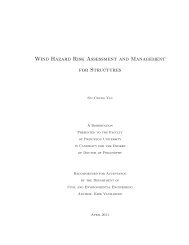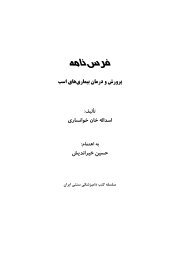Mental Health Nursing
Mental Health Nursing
Mental Health Nursing
You also want an ePaper? Increase the reach of your titles
YUMPU automatically turns print PDFs into web optimized ePapers that Google loves.
174 Acute <strong>Mental</strong> <strong>Health</strong> <strong>Nursing</strong><br />
• specific level of observation to be implemented;<br />
• clear directions regarding therapeutic approach; i.e., occupational therapy<br />
sessions;<br />
• timing of next review.<br />
It is also specified that the records should include the name of the person<br />
conducting the observation, the time they commenced and concluded their<br />
period of observation. It is also recommended that a detailed record of the<br />
patient’s behaviour, mental state and attitude to observation be recorded<br />
every 15 minutes.<br />
Such guidance, if implemented, should ensure accurate and clinically<br />
useful recording of an individual’s care. However, on the evidence of<br />
audits, such rigorous record keeping is not always observed. Porter et al.<br />
(1998) and Neilson and Brennan (2001) demonstrated substantial inconsistencies<br />
in record keeping, with missing or inaccurate information in<br />
patients’ records regarding their care whilst being observed. Examples<br />
included: missing staff names and signatures; lack of information for long<br />
periods of time; the times when observations were changed or reduced not<br />
clearly documented; alterations to written information, the use of correction<br />
fluid; poor information regarding patients’ mental state that bore no relevance<br />
to the stated risks (such as ‘watching TV’, ‘settled’, or ‘resting in bed’). Not<br />
only does such poor record keeping limit the ability to maintain a continual<br />
assessment of patients at risk, it also has legal implications as mental<br />
health professionals have a duty of care and are accountable for their<br />
actions, decisions and omissions. Thus if a nurse omits to record certain<br />
information in a patient’s records, or fails to communicate important information,<br />
concerns and/or observations to the appropriate team members,<br />
then a nurse could be seen to be acting negligently.<br />
Who should observe?<br />
There is considerable debate whether patients at-risk should always be<br />
observed by a permanent qualified member of staff, or whether it is acceptable<br />
for support workers, students or non-permanent (e.g., agency) staff to<br />
conduct this role. In practice, a variety of people perform the ‘observer’<br />
role, including qualified nurses, agency nurses, nursing and medical<br />
students, support workers, family members, friends and volunteers (Bowers<br />
and Park, 2001). Observation is often regarded as an unpleasant lowstatus<br />
and low-skill task and frequently delegated to either junior staff, or<br />
agency and bank staff who may be unknown to the patient (Barker and<br />
Cutcliffe, 1999; Dodds and Bowles, 2001). The reasons for this are complex<br />
and debatable, but include: problems of recruitment and retention<br />
of qualified and experienced nursing staff in acute in-patient units
















